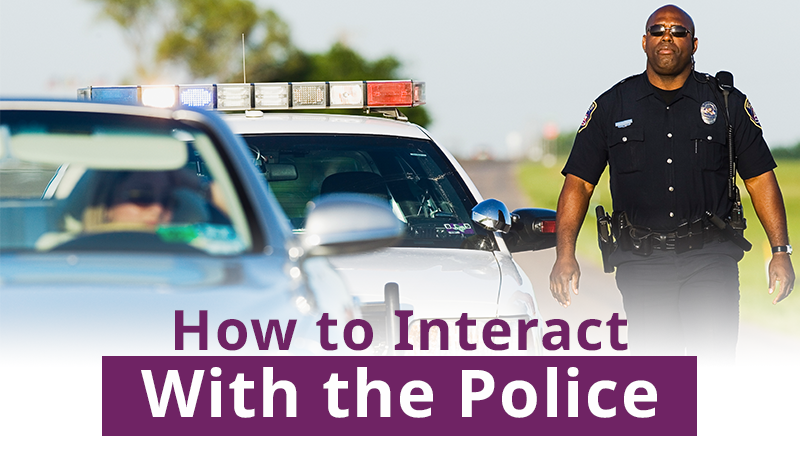
How to Interact with the Police
As civilians, interacting with the police can be an emotional, embarrassing and stressful situation, but it is important to maintain your wits. It may not always be a pleasant circumstance, but the most important thing to maintain is the safety of both yourself and the police officers. Given the recent news stories, it is understandable that you would be nervous when interacting with law enforcement, but the following tips will help keep you and the police safe, while also working to avoid unfair treatment.
What to do if you Get Pulled Over While Driving
Whether you get pulled over while driving or a police officer confronts you on the street, it is important to keep in mind that almost all police vehicles have a dashboard camera and many officers wear a body camera. So, it is difficult to argue that you didn’t run a stop sign or a red light if they have you on video doing it. It is also important to remember that the officer’s safety is also in danger while standing on the road next to your car, so they don’t want to be there any longer than you do. Because of this, always have your license, vehicle registration and proof of insurance in an easily accessible spot so thatr you aren’t fumbling around in your car. If you were in the wrong, the best thing to do is to be respectful and accept the ticket or warning. However, if you feel as though you were wrongly issued a citation, you will have an opportunity to go to court, so arguing with the police officer will typically only make the situation worse. Even if you are arrested, remain calm and respectful. If you are stopped on the street and feel as though you were unjustly stopped, here are a few tips to keep in mind:
- Stay in the car unless ordered out of the vehicle by police.
- Roll your window down 1/4 of the way after they approach your vehicle.
- If it is nighttime, turn on your inside dome light so that the office can clearly see you.
- Keep your hands on the wheel where the officer can see them at all times unless they ask you to hand them your documents.
- You do not have to talk to an officer, you are required to give your full name, but you do not have to provide any other information. But if you don’t want to talk, you should explicitly say that you wish to remain silent.
- Do not run away. Ask the police officer if you’re free to go and calmly walk away if they say yes. Do not insult the officer as you are leaving.
- You may decline a search of your vehicle but if the officer suspects you have a weapon, for the safety of everyone involved, they can pat you down.
- Always tell the truth or do not say anything at all.
- Remember to stay calm and have your passengers do the same.
Interacting With a Police Officer in Your Home
When you interact with the police in your home, the rules are the same as when you are on the street. However, there are a few tips to keep in mind to protect you as well as the police officer:
- Unless you have called the police or they are there as a safety precaution for you or your family, you should not let an officer into your home without a warrant. If they do have a warrant, it is important to thoroughly read the warrant before you let them in.
- If they have a search warrant, it is important that you know the exact areas they can search as well as what they are looking for.
- You do not have to answer any questions, even if you are threatened and if you do choose to talk to the officer, either go outside to talk with them, talk with them through a screen door or through a window.
The best way to maintain your safety as well as protect your rights is to stay respectful and peaceful. You should never make a police officer feel as though they are in danger. If you follow the cops orders and remain calm, even if it is an unlawful situation, you can prevent being treated unfairly as well as help your case if the officer does act wrongly. However, if you pull a gun or other type of weapon and/or become violent, the officers will defend themselves. In most situations, there is no reason to become hostile or violent with the police because they are trying to help you and keep the community safe.
Contact Free At Last Bail Bonds to learn more information about the safest way to interact with the police or if you are arrested and need information about posting bail.